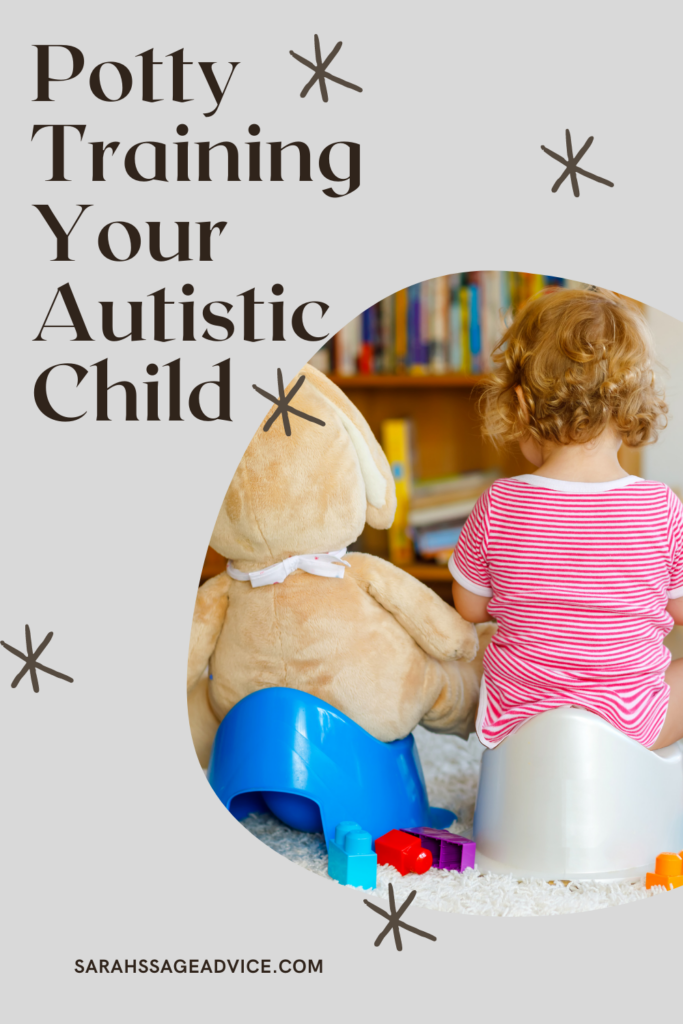Potty Training, especially for a first child can be a daunting feat on its own. Naturally, you will look for guidance online, on social media, from friends and family. Likely too, you will consider potty training your autistic child before they are diagnosed with Autism Spectrum Disorder.
Whether your child is autistic or neuro-typical my biggest piece of advice is to take everything in stride. Potty training can and will be frustrating if you let it be, if you start before your child is ready, and if you set expectations that are just not realistic for your child.
You will find article after article about potty training your child over a weekend. At least for us, that was not feasible.
My daughter was diagnosed at 3 years old. Before her diagnosis I did try to potty train off and on. I did get a lot of advice, both solicited and unsolicited, but even early on I understood the usual was not going to work with my daughter.
I heard stories about how my mother-in-law just followed my sister-in-law around with a kid’s potty for a day or two until she got it easy, or I heard “just wait until she’s in preschool when she sees the other kids going potty, she’ll catch on” Neither of those were feasible with my daughter and my husband and I understood that. It took a diagnosis for others to understand.
Factors about Autism that can affect Potty Training.
Interoception
It is common for autistic individuals and individuals with sensory processing disorder to have interoception issues. Interoception is the ability to perceive and understand internal sensations, like hunger, thirst, the need to use the bathroom, and feeling hot or cold.
Communication
It can take time for your child to build the communication abilities they need to potty train. This also really is true for parents. It can take time for parents to understand the ways your child communicates. Communication is not just verbal. How does your child react to a situation, do they utilize an AAC (Alternative Augmentative Communication) device, do they gesture or pull you to what they want or need? Do they seem to understand what you say to them? Consider the fact that they may understand a lot more then you think.
Toileting Readiness
No matter the child, readiness is not defined by an age. You should never expect your child should be potty trained by three years old or younger just because the neighbor’s daughter was. Every child is different. If your child is not ready to potty train, then trying to potty train them will just be a frustrating process for both them and you.
How do you know if your child is ready?
- They get a diaper when they need to go.
- They go off to a quiet spot to go in their diaper.
- They ask to have their diaper changed.
- They remove their own diaper because it is wet or dirty.
- They have some pattern for when they have to go.
- The child remains dry at night.
- The understand going in the potty.
- They have interest to go in the potty.
- Your child can pull up and down their own pants.
What steps can you try to potty train?
Many of these steps are just like potty training for any neurotypical child.
Set a timer.
Creating a time schedule for your child to try to go potty on the toilet can help them get used to going, not using a diaper, and the sensation of peeing in the toilet. They also have a lot of practice to get used to the process (taking down pants, sitting on the potty, wiping, pulling up pants, flushing toilet, washing hands, etc). If your child has interoception problems this can also get them used to a schedule. If they are used to a schedule to go to the bathroom they can work around not always feeling, or understanding, they need to go. Timers may help them as they grow well over potty training age to remind them to go when they do not feel the sensation.
Put them in underwear.
I know it can mean cleaning a lot of messes, but it may work for you to take away the diaper and put your child in underwear. Doing so, when your child pees and does not make it to the potty they will feel it easier. Feel themselves wet. Many may end up not liking this sensation and it could be an incentive to make it to the toilet. Others may not notice so it can be very dependent on the child.
My daughter specifically notices when she does pee, and it just runs down her leg, but it has never been a problem for her and even at times became a game. So, this point hasn’t really worked for us.
Let them have whatever will make them happy while sitting on the toilet.
Let your child read a book, play with a toy or fidget, or play with a tablet. You’ll need to have them sit on the toilet for a set amount of time to see if they have to go, to let them try to go, and if they don’t like being forced to sit there it can be frustrating. Letting them play with something will help to distract them.
Understand your child’s sensory needs.
If your child does not like the sound of a flushing toilet or washing their hands make adjustments for them. Flush the toilet after they leave the room, give them noise cancelling headphones, wash their hands with sanitizer or wipes rather than using the water in the sink. You want to make the bathroom inviting and if there’s any reason it is not to your child you need to make accommodations and adjustments.
Talk to them about going potty.
Speak to your child about going potty. Even when they’re not actually trying. If you’re changing a diaper talk about going in the potty next time. Ask them ALL THE TIME if they have to go. If they initiate by saying “potty”, “pee”, or directing you to the bathroom then get up and go right away. Show them their communication of a need is heard and responded to.
The biggest tip I have. Be patient and put any expectations behind you. Don’t push your child if they are not ready. Pushing them will just cause unnecessary frustration and may prolong the process due to that frustration. It’s okay, your child can take the time they need, and every child hit milestones at different times. If they don’t take to trying, wait a bit, try again later.
Sarah
Similar Posts:
National Autism Awareness Month: We Don’t Need Awareness, We Need Acceptance.
Common Misconceptions About Autism
I Am Not An Autism Mom, I Am a Mother of An Autistic Daughter


